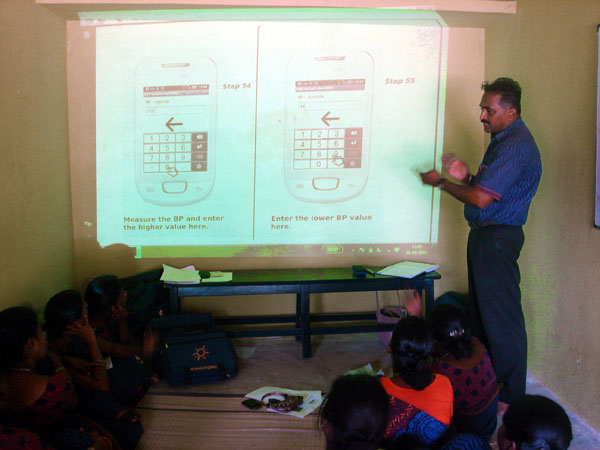By Deepak Rajanna, Vice President (Infrastructure and Technology) – ICTPH

Our field supervisor, Alex, training the Guides at Karambayam in the use of
mobile phones to collect Rapid Risk Assessment data.
A preventative approach to health invariably needs a sophisticated information management setup to track individuals and populations for their health indicators. At ICTPH, having realized the criticality of devising methods for collecting and managing information about individuals in order to proactively manage their health, we have piloted field-based data collection pilots, both using paper forms and mobile phones.
Our first attempt at capturing health data from individuals at a population-level was the Population-based Individual Screening Protocol (PISP), which involved Health Extension Workers or Guides administering forms and performing measurements such as BP, BMI etc, on every individual in the geography served by the RMHC. Although the PISP offered us invaluable insights into the health risks faced by people in our populations, the latencies involved in this process prevented us from responding adequately to the health risks that we unearthed. As we scale our services to cover wider geographies, we have realized that there is a need for quicker turn-around times in assessing health risks at catchment levels. As an improvisation to our model, we then moved the PISP to the clinic so that it is now administered by the Health Extension Worker (HEW) while the patient waits to see the physician. On the field, we stripped down the PISP questionnaire to evolve a nimbler version called the Rapid Risk Assessment(RRA) Survey. While the PISP was administered on OMR forms, the RRA was meant to be conducted using mobile phones. From our past experience with mobile-based data collection while doing enrollment in Andipatti village, ODK or Open Data Kit was an obvious choice. The ODK suite of tools offers interfaces to design forms, collect data and curate the survey results. However, it was not designed for the management of individuals and cases that health surveys typically require. While we scouted for alternatives, we came across a tool called Commcare and started a dialog with the company that started that project, Dimagi.
CommCare, and the related backend solution CommCareHQ, are solutions from Dimagi, a software company based in Masachussetts, USA, with the specific intention of enabling Community Health Workers to enrol, support and track individuals in her population. CommCare shares a lot of similarities with ODK; both are backed by Dimagi, are open-source, and share many of the technical standards for designing and rendering forms. CommCare is different, however, in several crucial ways. For example it supports a secure hosted server and offers a way to restore enrolments done by a CHW back on her phone from the server so that new health surveys can be administered. CommCare also offers features – notably the use of multimedia as communication aids – that we haven’t employed yet, but what we have seen so far has given us reasons to be excited about our partnership with Dimagi. Dimagi has piloted CommCare in various CHW programs in several countries, including the ASHA program in India. We hope to benefit from that collective experience. Since Dimagi’s stated objective for CommCare is to progressively improve the effectiveness of CHWs, and since the HEW happens to be a crucial component of our health systems design, the alignment between ICTPH and Dimagi is strong. Dimagi also has a crucial role in anchoring an ecosystem of users – field coordinators, software developers, program managers, researchers- that has enabled a healthy exchange of knowledge.
On the field, we have just kicked off the RRA in Karambayam village using our Guides. We will soon post more information about the details of that project on this blog. For now, as we monitor realtime health data coming in from the handsets of our Guides, we are convinced that technology and companies like Dimagi and their solutions have a pivotal role in driving health outcomes in our populations.


Leave a Reply
1 Comment on "Partnership with Dimagi: Use of CommCare to carry out Rapid Risk Assessment through Health Extension Workers (HEW) in Karambayam"
[…] Partnership with Dimagi: Use of CommCare to carry out Rapid Risk Assessment through Health Extension… […]